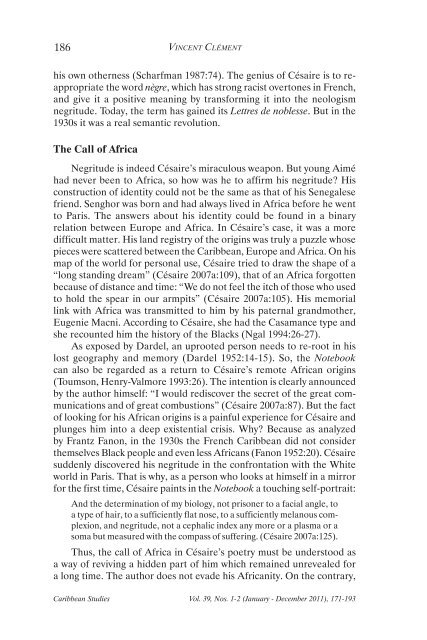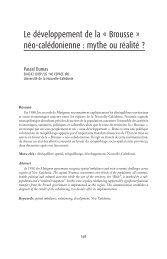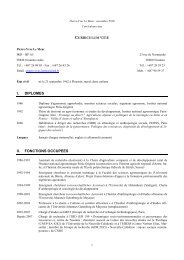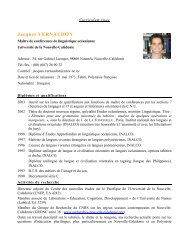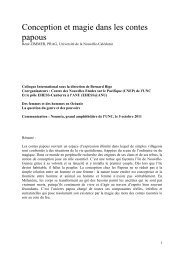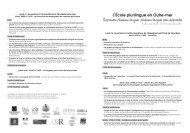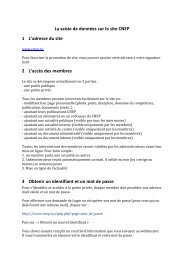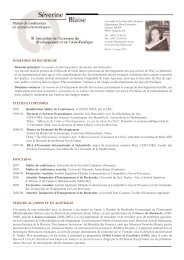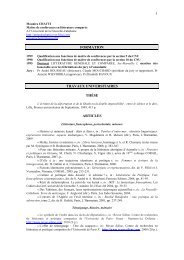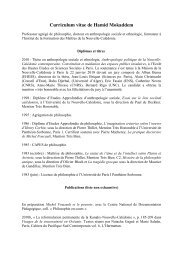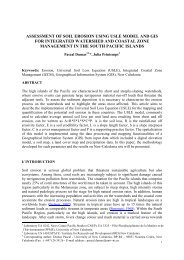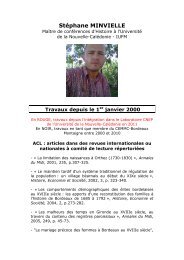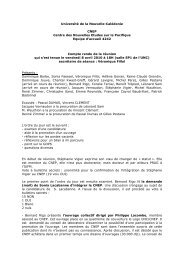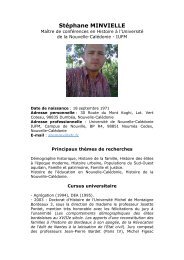LATITUDE AND LONgITUDE Of THE PAST - Centre des Nouvelles ...
LATITUDE AND LONgITUDE Of THE PAST - Centre des Nouvelles ...
LATITUDE AND LONgITUDE Of THE PAST - Centre des Nouvelles ...
You also want an ePaper? Increase the reach of your titles
YUMPU automatically turns print PDFs into web optimized ePapers that Google loves.
186Vincent Clémenthis own otherness (Scharfman 1987:74). The genius of Césaire is to reappropriatethe word nègre, which has strong racist overtones in French,and give it a positive meaning by transforming it into the neologismnegritude. Today, the term has gained its Lettres de noblesse. But in the1930s it was a real semantic revolution.The Call of AfricaNegritude is indeed Césaire’s miraculous weapon. But young Aiméhad never been to Africa, so how was he to affirm his negritude? Hisconstruction of identity could not be the same as that of his Senegalesefriend. Senghor was born and had always lived in Africa before he wentto Paris. The answers about his identity could be found in a binaryrelation between Europe and Africa. In Césaire’s case, it was a moredifficult matter. His land registry of the origins was truly a puzzle whosepieces were scattered between the Caribbean, Europe and Africa. On hismap of the world for personal use, Césaire tried to draw the shape of a“long standing dream” (Césaire 2007a:109), that of an Africa forgottenbecause of distance and time: “We do not feel the itch of those who usedto hold the spear in our armpits” (Césaire 2007a:105). His memoriallink with Africa was transmitted to him by his paternal grandmother,Eugenie Macni. According to Césaire, she had the Casamance type andshe recounted him the history of the Blacks (Ngal 1994:26-27).As exposed by Dardel, an uprooted person needs to re-root in hislost geography and memory (Dardel 1952:14-15). So, the Notebookcan also be regarded as a return to Césaire’s remote African origins(Toumson, Henry-Valmore 1993:26). The intention is clearly announcedby the author himself: “I would rediscover the secret of the great communicationsand of great combustions” (Césaire 2007a:87). But the factof looking for his African origins is a painful experience for Césaire andplunges him into a deep existential crisis. Why? Because as analyzedby Frantz Fanon, in the 1930s the French Caribbean did not considerthemselves Black people and even less Africans (Fanon 1952:20). Césairesuddenly discovered his negritude in the confrontation with the Whiteworld in Paris. That is why, as a person who looks at himself in a mirrorfor the first time, Césaire paints in the Notebook a touching self-portrait:And the determination of my biology, not prisoner to a facial angle, toa type of hair, to a sufficiently flat nose, to a sufficiently melanous complexion,and negritude, not a cephalic index any more or a plasma or asoma but measured with the compass of suffering. (Césaire 2007a:125).Thus, the call of Africa in Césaire’s poetry must be understood asa way of reviving a hidden part of him which remained unrevealed fora long time. The author does not evade his Africanity. On the contrary,Caribbean Studies Vol. 39, Nos. 1-2 (January - December 2011), 171-193


